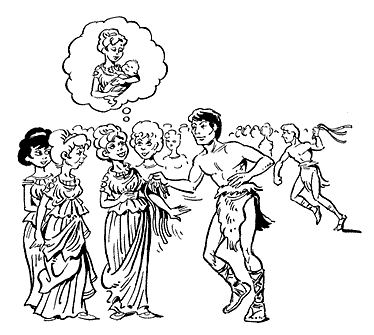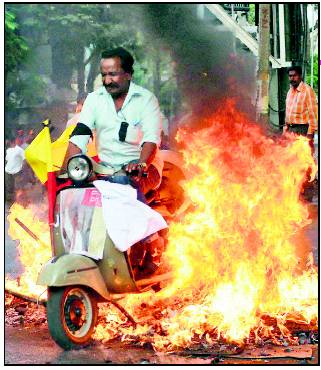(Questions from Julius Caesar Workbook for ICSE Schools, India by Xavier Pinto published by Morning Star.If you need a clarification from me,just post a comment below.I will respond as soon as possible.)
I
i.)Where does the scene take place? Why have the characters, referred to in the extract gone there?
The scene had taken place during the feast of Lupercal,who is the god of fertility. The characters referred to in the extract had gone there because they wanted to celebrate the festival of Lupercal.
ii.) What is the “Holy chase’? What is it's significance?
The ‘Holy Chase” is the chase performed during the feast of Lupercal.It is supposed to make sterile women fertile and thus have children.
iii.)What instructions did Caesar give Calphurnia earlier, regarding the holy chase?
The instructions that Caesar gave Calphurnia regarding the holy chase was that she must stand in the way of Antony’s run. Antony's touching her would remove the curse of sterility.
iv.) Give the meaning of:
(a)Shake off their sterile curse: Eliminate the curse of sterlity of infertility.
(b)“Do this”,it is perform’d: It must be done.
v.)According to the extract, what type of relationship exists between Caesar and Antony?
Antony is Caesar’s nephew. It is true bond of love and respect between Mark Anthony and Julius Caesar.
II.
i.) What is meant by “Beware the ides of March”? What is it's significance in the play”, Julius Caesar?
“ Beware the ides of March” signifies that caution is required on the 15th of March.During the ides of March,the soothsayer believes that, Caesar would be attacked by his enemies.
ii.)What was the Caesar’s reaction to the soothsayer’s warning? What light does his reaction throw on Caesar’s character?
Caesar did not believe what the soothsayer said and called him a dreamer. He completely dicarded the warning of the Soothsayer.
From this reaction of Julius Caesar, we come to know that Caesar did not believe in astrology.We can also conclude that Julius Caesar was very confident of himself and did not easily take advice from others.
iii.) What, in your opinion, is the soothsayer’s motive in warning Caesar to beware the ides of March?
The soothsayer wanted to save Caesar from his enemies and wanted Caesar to be grateful to him for a timely warning.
iv.)Why does Caesar want the soothsayer to look at him? What does Caesar think of the soothsayer?
Caesar wanted the soothsayer to look at him as he was deaf with one ear.If the soothsayer looked at him, Caesar would be able to hear the soothsayer clearly.
Caesar thought that the soothsayer was a dreamer.
v.) Give another example of warning about the danger which is in stock for Caesar.
Artimedorus wanted to give his petition to Caesar to warn Caesar about the conspiracy against him and the impending attack on Caesar.However, Caesar refused to see his petition.
III.
i.)Where are Brutus and Cassius at this time?
Brutus and Cassius are at the feast of Lupercal.
ii.)Why does Brutus not go along with Caesar to the games? With whom does Brutus contrast himself? How?
Brutus does not go with Caesar to the games because he is not fond of sport.Brutus contrasts himself with Antony by saying that he lacks the liveliness of Antony.
iii.)What does Cassius accuse Brutus of?
Cassius accuses Brutus of not being friendly and truthful to him.
iv.) What do you think is the motive of Cassius in professing friendship to Brutus? What type of a person was Cassius?
The motive of Cassius in professing friendship to Brutus is to get him to join the group which is plotting against Caesar.Cassius was a shrewd and a vindictive person.
v.)Give the meaning of:
a) “vexed I am”: I am angry.
(b)“Of late with passions of difference”:Conflicting thoughts and emotions.
IV.
i.) Where are Brutus and Cassius at this time?Why have they come together?
Brutus and Cassius were on the streets of Rome.They have come together to celebrate the festival of Lupercal.
ii.)What reason does Brutus give here for the ‘shouting’? What was the real reason?
The reason that Brutus gives for the shouting was that the were people celebrating the appointment of Caesar as King. The real reason for the shouting was that people did not want Caesar to wear the crown.
iii.)Why was Brutus afraid that Caesar might become King?
Brutus was afraid of Caesar becomeing king because he felt that Caesar would become a tyrant once he became king.
iv.)When Brutus says, “ I would not Cassius; yet I love him well,” he is undergoing conflict of two emotions. What are they?
The two conflicting emotions are:
(a)Brutus loves and respects Caesar yet...
(b)He does not want Caesar to become King.
v.)How did Cassius finally convince Brutus that Caesar should be killed?
Cassius asks Brutus what was so special about Caesar that his name should be spoken of more than that of Brutus. He says that Brutus's name was as peasing to hear as that of Caesar's name. He questions Brutus why Brutus should not be as powerful as Caesar since he was as good as Caesar in all respects. He finally convinced Brutus by saying that tolerating Caesar was like tolerating the devil being the king.
V.
i.) Who was Aeneas? Which legendary incident connected with Aeneas is referred to in the extract?
Aeneas was the son of Anchises. He was a brave soldier who fought in the battle of Troy when the Greeks attacked it. The incident referred to in the extract is about how Aeneas carried away his injured father from the battle field by carrying him on his shoulders away from the flames of Troy and also across the river Tiber to safety.
ii.) Why did Cassius compare himself to Aeneas?
Cassius compares himself with Aeneas because like Aeneas saved Anchises, Cassius saved Caesar from drowning in the river Tiber.
iii.) Who is “ this man’? What grudge does Cassius harbor against “this man”?
“This man” is Julius Caesar. The grudge that Cassius holds against Caesar is that Caesar was very powerful even though Caesar did not have all the abilities and talents of Cassius.
iv.)Just before the extract Cassius states that he is equal to Caesar in three aspects.What are these three aspects?
The three aspects in which Cassius states that he is equal to Caesar are:
- He was born as free a man as Caesar.
- The food that he ate was as good as the food that Caesar ate.
- He could bear the cold of winter as well as Caesar could bear it.
v.) In his speech, Cassius refers to an incident in which he was much superior to Caesar. Narrate the incident.
This incident pertains to the time when Caesar and Cassius had to swim across the swollen Tiber river. While Cassius was able to swim across Caesar could not make it across the river and was on the verge of drowning. Cassius had to help Caesar to get across. In the absence of help from Cassius Caesar would have drowned.
vi.) Give one example from the scene, which makes you feel that Cassius is a democrat in his views.
Cassius asks Butus why the name of Caesar should be spoken about more than Brutus. His tells Brutus that his name ( Brutus’s name) was as beautiful as that of Caesar. This shows that Cassius was a democrat who wanted greater equality with Caesar for the citizens of Rome.
VI.
i.) What is referred to as “the great flood”? Why is this expression used in the text?
The “Great Flood” refers to the time in Roman history very long back. This expression is used in the text to convey that never in the history of Rome has one man dominated so much as Caesar was dominating.
ii.)Compare the present age with the olden times as far as Rome is concerned.
As far as Rome is concerned, the olden times were very democratic. In every era of the olden times there were several people who had high standing. However, in the present age (the time of Julius Caesar) only one man dominated – who was Julius Caesar.
iii.) What arguments does Cassius give (just before the extract) to show that Caesar is not superior to Brutus?
The arguments that Cassius gives to say that Caesar is not superior to Brutus are as under:
-According to Cassius when both the names are written ( Julius Caesar and Brutus) each sound and are as beautiful as the other.
-Both Brutus and Caesar eat the same food, therefore both are equally good.
-If one has to invoke a spirit, both names can do the job equally well.
iv.) “There was a Brutus”. Who was this Brutus?
This Brutus was an ancestor of the Brutus in this act.
VII.
i.)Where is Caesar at this time? Of whom is he speaking?
At this time, Caesar is returning from the games after celebrating the festival of Lupercal. He is speaking of Cassius at this time.
ii.) Do the earlier episodes in the play suggest that Caesar has judged this person’s character accurately? Explain briefly.
Yes, Caesar has judged the character of Cassius correctly. We can say this because Caesar correctly said that people like Cassius are dangerous to his security since they think well and understand the motives of other people. We can say from the previous incidents that he judged the character of Cassius correctly.
iii.)Immediately before this speech, what type of man has Caesar said he prefers for his security?
Caesar said that he prefers people for his security who are fat, well fed and well slept.
iv.) What personal physical weakness is revealed by Caesar in the remaining par t of this speech? What contrast is created by this revelation with the last two lines quoted above?
The personal physical weakness revealed by Julius Caesar is that he was deaf in his left ear. The contrast that is created is that on one hand Julius Caesar calls himself perfect but on the other hand he reveals his physical weakness.
v.) Give two other examples of Caesar’s physical weakness mentioned earlier in this scene.
The two other weaknesses are:
-Julius Caesar suffered from epilepsy.
-He was deaf in his left ear.
VIII.
i.)When does Casca say this? To whom?
Casca says this to Cassius and Brutus on his return from the games of Lupercal when Brutus pulls him by his cloak.
ii.) Narrate briefly the “news” that Casca has already related.
The news that Casca has already related pertains to :
-The crown being offered to Caesar by Mark Anthony,thrice.
-About Caesar fainting to an attack of epilepsy
-About Marullus and Flavius being given the death sentence.
iii.) Explain “ pulling scarfs off Caesar’s images” and “put to silence”.
-“Pulling off scarfs…” means removing all the decorative items from Caesars statues.
-“Put to silence” means to be given death sentence.
iv.) What does “put to silence” reveal about Caesars character?
This reveals that Caesar was very intolerant and could not tolerate any dissent. It also shows that he was aware of what was going on in Rome.
v.) What reason for their action does Flavius give in the opening scene of the play?
The reason that Flavius gives for removing decorations on Caesars statues is that he feels that it is akin to plucking feathers from a bird. It would ensure that Caesar did not act high and mighty.
src="http://pagead2.googlesyndication.com/pagead/show_ads.js">


















